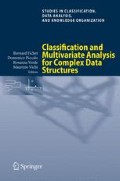Abstract
The article is about the problem of the treatment of qualitative variables in the Structural Equation Models with attention to the case of Partial Least Squares Path Modeling. In literature there are some proposals based on the application of known statistical tecniques to quantify the qualitative variables. Starting from these works we propose an external quantification for only qualitative variables by the Alternating Least Squares, obtaining the optimal quantification (vectors of optimal scaling), a future objective to develop an algorithm that computes simultaneously the vectors of optimal scaling and the optimal regression coefficients, between the variables. We will present an application of our method to a real dataset.
Access this chapter
Tax calculation will be finalised at checkout
Purchases are for personal use only
Preview
Unable to display preview. Download preview PDF.
References
De Leeuw, J.: HOMALS and PRINCALS some generalizations of principal components analysis. In: Diday, E. et al. (eds.) Data Analysis and Informatics, pp. 231–241. North-Holland Publishing Company, Amsterdam (1980)
Gifi, A.: Nonlinear multivariate analysis. Department of data Theory. University of Leiden, The Netherlands (1981)
Jakobowicz, E., Derquenne, C.: A modified PLS Path Modeling algorithm handling reflective categorical variables and a new model building startegy. Comput. Stat. Data Anal. 51, 3666–3678 (2007)
Joreskog, K.G.: A general method for estimating linear structural equation system. Goldberger and Duncan, pp. 85–112 (1973)
Kruskal, J.B., Shepard, R.N.: A nonmetric variety of linear factor analysis. Psycometrika 39, 123–157 (1974)
Lauro, C., Nappo, D.: Multivariate Analysis of OVC survey data and Decision Support tools – OVC Project AVSI second survey (2008)
Lohomoller, J.B.: Latent variables Path Modeling with partial least squares. Physica-Verlag, Heildelberg (1989)
Lovaglio, P.G.: La stima di Variabili Latenti da variabili osservate miste. Statistica LXII, 203–213 (2002)
Young, F.W.: Quantitative analysis of qualitative data. Psychometrika 46, 357–388 (1981)
Wold, H.: Soft modeling: the basic design and some extensions. In: Joreskog, K.G. Wold, H. (eds.) Systems Under Indirect Observations. Part II, pp. 1–54. North Holland, Amsterdam (1982)
Author information
Authors and Affiliations
Corresponding author
Editor information
Editors and Affiliations
Rights and permissions
Copyright information
© 2011 Springer-Verlag Berlin Heidelberg
About this paper
Cite this paper
Lauro, C., Nappo, D., Grassia, M., Miele, R. (2011). Method of Quantification for Qualitative Variables and their Use in the Structural Equations Models. In: Fichet, B., Piccolo, D., Verde, R., Vichi, M. (eds) Classification and Multivariate Analysis for Complex Data Structures. Studies in Classification, Data Analysis, and Knowledge Organization. Springer, Berlin, Heidelberg. https://doi.org/10.1007/978-3-642-13312-1_34
Download citation
DOI: https://doi.org/10.1007/978-3-642-13312-1_34
Published:
Publisher Name: Springer, Berlin, Heidelberg
Print ISBN: 978-3-642-13311-4
Online ISBN: 978-3-642-13312-1
eBook Packages: Mathematics and StatisticsMathematics and Statistics (R0)

